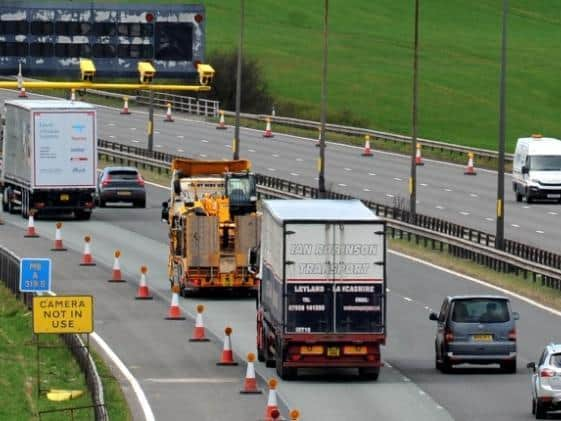Poll reveals the scale of opposition to smart lanes
and live on Freeview channel 276
The growing opposition by local campaigners to the start of work on Wigan’s first stretch of Smart motorway is being mirrored by communities across the country.
A new web poll on the controversial roadways from the UK’s largest independent road safety charity, IAM RoadSmart, has revealed that the majority of respondents want a halt on their construction until the safety case is fully proven.
Advertisement
Hide AdAdvertisement
Hide AdAnd furthermore, a massive 84 per cent of the 4,500 respondents surveyed had little faith in the current safety systems’ abilities to detect them if they were to breakdown in a running lane and protect them until help arrived.


Highways England began work on the 10-mile stretch of M6 – from junction 21a near Warrington to junction 26 near Wigan – late last month, and it is due to be completed by spring 2023. despite fears of the local MPs, Yvonne Fovargue and Lisa Nandy.
The all-lane running motorway will have no hard shoulder, although there will be 10 new emergency areas.
Ms Fovargue said: “While I am not against the improvement of motorways in general, I would like to see the present work on the M6 stopped in favour of a safer way of improving that stretch of motorway.
Advertisement
Hide AdAdvertisement
Hide Ad“I realise that this will be very difficult to achieve given that work is due to start imminently and the Government have stated that they will continue with this approach.
“I am of the view that smart motorways are unsafe and the rollout should be stopped.”
Ms Nandy said she also shared the concerns of campaigners around the safety of such schemes: “It has been reported that since 2015 nearly 40 lives have been lost as a result of smart motorways. Even the former roads minister who introduced the programme has called for the rollout of the scheme to be halted.”
Their comments come as campaigner and ex-Independent councillor in Bryn, Don Hodgkinson raised similar concerns, describing the motorways as “death traps” and “dangerous” because of their lack of or no hard shoulders.
Advertisement
Hide AdAdvertisement
Hide AdNeil Greig, IAM RoadSmart Director of Policy & Research, said: “Our members include many high mileage, experienced and confident motorway users but the results of this survey are clear to see, with the vast majority having very little, or no confidence, in the safety of smart motorways.
“We would urge the Department for Transport and Highways England to listen to what smart motorway users are saying and to consider our findings, along with other in-depth research, to determine the best approach to developing the smart motorway network. Delaying decisions on smart motorways will only lead to more drivers getting stressed.
“Alongside more education for drivers, IAM RoadSmart wants to see strong leadership with clear decisions taken soon on whether the programme should be reversed, or provided with the appropriate funding that will speed up delivery of the promised refuges, CCTV and vehicle detection technology.”
Meanwhile, other hard-hitting results from the IAM RoadSmart study found that 81 per cent of motorists felt less safe travelling on a smart motorway compared to a normal one, and 81 per cent agreed that hard shoulders should be immediately reinstated on smart motorways.
Advertisement
Hide AdAdvertisement
Hide AdMore than 80 per cent also wanted safety refuges on smart motorways to be spaced at 500 metres apart or less.
Finally, 40 per cent of drivers found no noticeable improvement in their journey time, with only 4 per cent finding a very noticeable improvement compared to 6 per cent who actually found it worse than before.
“This survey highlights a potentially very serious unintended consequence in that driver reluctance to use smart motorways could create increased traffic on local A and B roads.
“This would undoubtedly lead to an increased risk of collision and injury with even more delays and driver frustration resulting,” Mr Greig concluded.
Thanks for reading. If you value what we do and are able to support us, a digital subscription is just £1 for your first month. Try us today by clicking here and viewing our offers ...